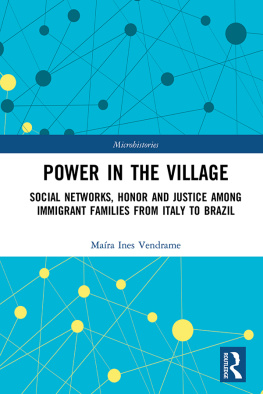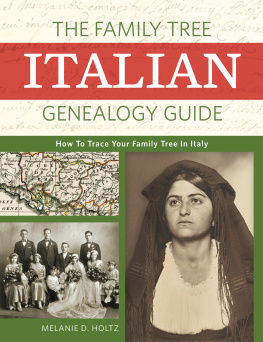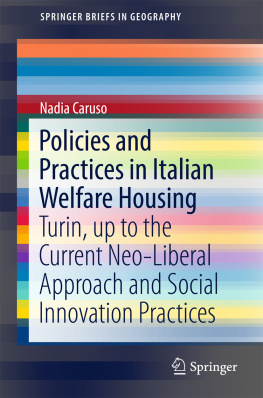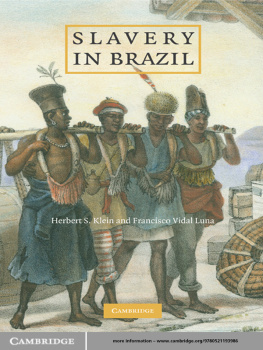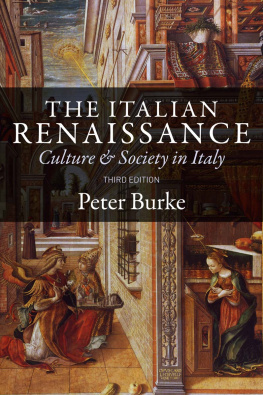Power in the Village
Power in the Village explores the formation of late-nineteenth-century Italian rural society in southern Brazil, through an examination of how Italian peasants in northern Italy and southern Brazil solved issues related to family honor.
Looking specifically at social networks and justice practices to examine the kind of rationality that ruled individual and family behaviors, the book offers an understanding of the restoration of social balance in these communities, and explores the culture of immigrants, particularly in issues related to honor and morality. Taking as a case study the ambush and murder of a parish priest, Antonio Sorio, in January 1900 in Silveira Martins, a small town of Italian immigrants, Vendrame offers a reinterpretation of the society of Italian immigrants in southern Brazil. She argues that rather than being an idyllic picture of a homogeneous and harmonious society, the colonial settlements were places pervaded by tension, solidarity and self-interest, which guided individual and collective behavior.
This book will be of great interest to scholars working in Italian history, Brazilian history, immigration history and the history of colonialism. It will also be of interest to scholars working on ethnographic and religious history, as well as to social anthropologists.
Mara Ines Vendrame is Professor of History at the University of Vale do Rio dos Sinos (UNISINOS), Brazil. She is the author of two books and several articles on Italian immigration to Southern Brazil. She was the winner of the fourth Vanni Blengino Award, Italy, 2015 (AREIA international award) with the text: Offenses, reparations and community control: the justice of Italian immigrants in the colonial nuclei of southern Brazil and in 2015 she received the ANPUH-RS thesis award. Her research interests include social networks and migratory strategies, family, honor, justice practices, criminality, women, community organization, religiosity and popular culture.
Microhistories
Series editors: Sigurur Gylfi Magnsson and Istvn M. Szijrt
The Microhistories series is open to books employing different microhistorical approaches, including global microhistories aimed at grasping worldwide connections in local research, social history trying to find determining historical structures through a micro-analysis, and cultural history in the form of microhistories that relate directly to large or small scale historical contexts. They are interesting stories that bring the everyday life and culture of common people of the past close to the readers, without the aspiration of finding answers to general big questions or relating them to the grand narratives of history. The series is open to publishing both theoretical and empirical works, but with a focus on empirical monographs that can communicate stories from the past and capture the imagination of our readers.
Published
The Great Nightmen Conspiracy
A Tale of the 18th Centurys Dishonourable Underworld
Tyge Krogh
Production of Locality in the Early Modern and Modern Age Places
Angelo Torre
Emotional Experience and Microhistory
The Life Story of a Destitute Pauper Poet in the 19th Century
Sigurur Gylfi Magnsson
Power in the Village
Social Networks, Honor and Justice among Immigrant Families from Italy to Brazil
Mara Ines Vendrame
For more information about this series, please visit: www.routledge.com/Microhistories/book-series/MICRO
First published 2020
by Routledge
2 Park Square, Milton Park, Abingdon, Oxon OX14 4RN
and by Routledge
52 Vanderbilt Avenue, New York, NY 10017
Routledge is an imprint of the Taylor & Francis Group, an informa business
2020 Mara Ines Vendrame
Translated by Miriam Adelman
The right of Mara Ines Vendrame to be identified as author of this work has been asserted by them in accordance with sections 77 and 78 of the Copyright, Designs and Patents Act 1988.
All rights reserved. No part of this book may be reprinted or reproduced or utilised in any form or by any electronic, mechanical, or other means, now known or hereafter invented, including photocopying and recording, or in any information storage or retrieval system, without permission in writing from the publishers.
Trademark notice: Product or corporate names may be trademarks or registered trademarks, and are used only for identification and explanation without intent to infringe.
British Library Cataloguing-in-Publication Data
A catalogue record for this book is available from the British Library
Library of Congress Cataloging-in-Publication Data
Names: Vendrame, Maira Ines, author. | Adelman, Miriam, translator.
Title: Power in the village : social networks, honor and justice among immigrant families from Italy to Brazil / Maira Ines Vendrame; translated by Miriam Adelman.
Other titles: O poder na aldeia. English | Social networks, honor and justice among immigrant families from Italy to Brazil
Description: London, UK ; New York, NY : Routledge/Taylor & Francis Group, 2020. | Series: Microhistories | Includes bibliographical references and index.
Identifiers: LCCN 2020000032 (print) | LCCN 2020000033 (ebook) | ISBN 9780367025175 (hardback) | ISBN 9780429399138 (ebook)
Subjects: LCSH: ItaliansBrazil. | BrazilEmigration and immigration. |
BrazilHistory.
Classification: LCC F2659.I8 V45413 2020 (print) | LCC F2659.I8 (ebook) | DDC 981dc23
LC record available at https://lccn.loc.gov/2020000032
LC ebook record available at https://lccn.loc.gov/2020000033
ISBN: 978-0-367-02517-5 (hbk)
ISBN: 978-0-429-39913-8 (ebk)
To my grandfather Gentil (in memoriam)and my grandmother Alvina Maria (in memoriam)who awoke my curiousity about theimmigrants lives.
The history of Italian emigration has engaged many historians and produced an impressive array of research so much that, in recent years, it has seemed to be a saturated field, one leaving little space for renewal. The major demographic and social phenomena that led to the departure of millions of people from 19th century Italy have been researched from diverse points of view: from quantitative perspectives, or a focus on places of settlement, or causes of push and pull. General models of interpretation have supplied a generic picture, yet at the same time there has also been a multiplication of stories of individual events, of suffering and adaptation, of violence and irregular forms of life and of new relations with the country of origin that provide an illustration of particularities. Yet these two routes through the general and the particular have not produced convergence.
Attention to aspects of cultural consolidation and change, of the partial preservation of original dialects, of religiosity and political participation have led to folkloristic readings, often sentimental. Such accounts tend to highlight the actions of militant elite groups, yet are unable to penetrate the depths of meaning of what was such a monumental transformation of life, feelings and daily life strategies for peasant populations. A historical and anthropological reading of these realities has yet to be provided. And, over a number of years this is my impression historical research actually became more rigid, lacking in new proposals that were able to ask new questions, introducing new methodologies on the theme of immigration.

